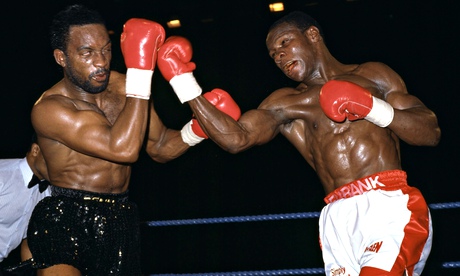News
SECOND FROCH vs GROVES: WHAT IS IT ABOUT REMATCHES?
30/05/2014 - 9.37.13
Second Froch-Groves bout poses question: what is it about rematches?• Kevin Mitchell picks his five most memorable rematchesKevin Mitchell - The Guardian  Eddie Hearn was a cheeky teenager waiting for his beard to grow when his father, Barry, staged a rematch in a football stadium between Britain’s two best super-middleweights that held the nation enthralled, and one of boxing’s oldest verities was honoured.
That fight at Old Trafford in 1993 confirmed in the public imagination the strength of the animosity between Nigel Benn and Chris Eubank, who were happy to return to their mutual hell for one more lucrative night. Nothing sells like a rematch, was the oft-repeated mantra of Don King, who was in on that show and who thought he had the rights to promote the winner in a possible trilogy.
What King, normally the most astute of negotiators, failed to factor into the contract, however, was the possibility of a draw – and that’s how the fight panned out in front of 47,000 fans on a mild October night. So, for a variety of reasons, Benn-Eubank III never happened, and both of them were probably glad of it, with not a lot left to give to each other.
The history of returns in boxing is littered with some terrific scraps but, as good a contest as that one was, it was never likely to reach the heights of their first collision, three years earlier in Birmingham when they were middleweights. The winner that night by ninth-round stoppage after an absolute war was Eubank, who told ITV’s ringside commentator, Gary Newbon, he was hurting in places he didn’t know he had places.
So, where will Saturday night’s rematch at Wembley Stadium between Carl Froch and George Groves, promoted by Hearn Jr, sit in the pantheon of do-it-again contests? It will, without doubt, be the biggest occasion in British boxing since before the Second World War, staged at the home of football in front of 82,000 fans, and the fight itself is loaded with enough raw spite to generate a memorable tear-up.
I suspect it might not go exactly to script – but let’s leave that for a later discussion. What both fighters are buying into is the seductive notion of payback, of getting square, of proving “once and for all” (although not in every circumstance) who is the better man. Anyone who scrapped at school and went home with a bloody nose will identify with the gut-strong notion of revenge.
Once fighters tested themselves over 15 rounds; indeed, in the earliest days, there was no limit at all, and no gloves. But in the relatively civilised period of the sport, the proper test at the highest level demanded 45 minutes of combat and, usually, there was no room left for doubt.
The reason old war horses fought a second, third or umpteenth time was for pride and money, not always in that order. My accompanying list of favourite rematches shines light on older contests over modern bouts not because of nostalgia but because there was more naked brutishness, more desperation and hunger then, and for a lot of fighters each big fight was a ticket out of genuine poverty. They fought to live.
That was not the case with Muhammad Ali and Joe Frazier, admittedly, when they turned up on a Wednesday morning at Araneta Coliseum in Quezon City in 1975 for what was to be enshrined as the Thrilla in Manila butwhich, more pertinently, drove each man to a point near death. That is no exaggeration. It is still disturbing to watch the 14th and final round of the fight, with Frazier, his one good eye closing fast but his heart still beating hard, trying so hard to convince his trainer, Eddie Futch, that he was one punch from glory. Eddie said no. The trilogy was done and the argument was settled.
But was it? In the other corner, Ali was ready to quit, saved only from that fateful choice by an observant second, who saw Joe looking up balefully at Futch on his stool, saved from himself by one of boxing’s most compassionate mentors. Rematches do not guarantee fireworks, though – as Ali’s second fight with Frazier the previous year illustrated. It is the forgotten part of the trilogy.
One of the other reasons there were more rematches to savour in the old days was that there were, simply, more fights. These guys thought nothing of fighting two or three times a month – and the king of them all, Sugar Ray Robinson, was as busy a head-hitter as any of his contemporaries, much to Jake LaMotta’s simultaneous regret and benefit.
Robinson lost only one of their six fights, their “first rematch”, over 10 rounds, when he spotted him more than a stone. They might not have imagined there would be four more battles, the last the most memorable, in 1951. For students of gore and boxing theatre, it was worth waiting for. Those were the days of central control – that is, mob rule. Thereafter, as the gangsters’ power diminished or was disguised, the business began to fracture beyond control. Yet, paradoxically, the suits who make the final calls now are increasingly drawn back to rematches and serial fights, because they have the antagonists in one camp. The deals are easier to make. So that is why we might see Manny Pacquiao fight Juan Manuel Márquez for a fifth time (he has a date pencilled in for Macao in November), instead of fighting Floyd Mayweather for the first time.
As for Froch-Groves III, I think the only way it happens is if Froch wins and continues to box on at 37. If Groves wins, I suspect he might take his trophies elsewhere. Whatever he says about how easily he is going to beat the old man, he knows he is in for the sort of experience only the bravest survive. As Froch told me: “I’ve never lost a rematch, amateur or pro.”
Source: www.theguardian.com/sport/2014/may/29/boxing-third-froch-groves-bout-rematch-revenge-drama |
